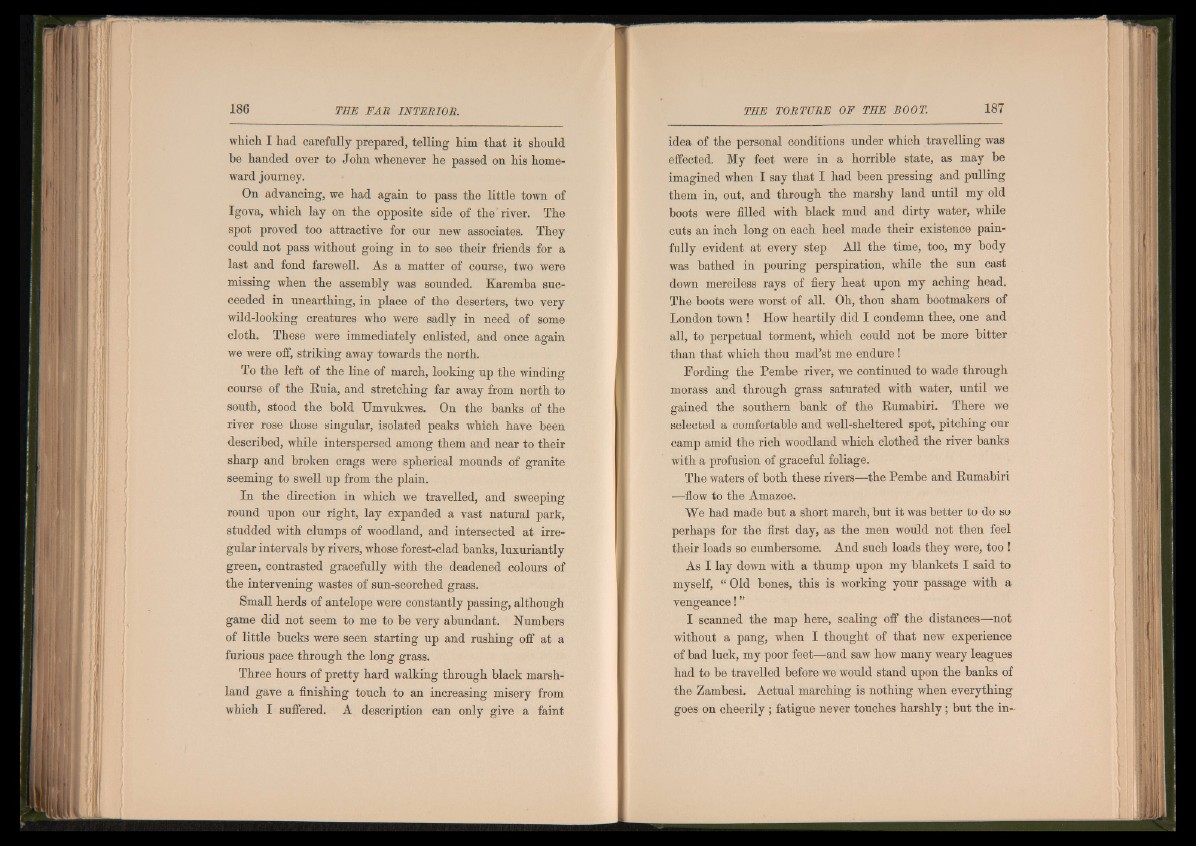
which I had carefully prepared, telling him that it should
he handed over to John whenever he passed on his homeward
journey.
On advancing, we had again to pass the little town of
Igova, which lay on the opposite side of the’river. The
spot proved too attractive for our new associates. They
could not pass without going in to see their friends for a
last and fond farewell. As a matter of course, two were
missing when the assembly was sounded. Karemba succeeded
in unearthing, in place of the deserters, two very
wild-looking creatures who were sadly in need of some
cloth. These were immediately enlisted, and once again
we were off, striking away towards the north.
To the left of the line of march, looking up the winding
course of the Ruia, and stretching far away from north to
south, stood the bold TJmvukwes. On the banks of the
river rose those singular, isolated peaks which have been
described, while interspersed among them and near to their
sharp and broken crags were spherical mounds of granite
seeming to swell up from the plain.
In the direction in which we travelled, and sweeping
round upon our right, lay expanded a vast natural park,
studded with clumps of woodland, and intersected at irregular
intervals by rivers, whose forest-clad banks, luxuriantly
green, contrasted gracefully with the deadened colours of
the intervening wastes of sun-scorched grass.
Small herds of antelope were constantly passing, although
game did not seem to me to be very abundant. Numbers
of little bucks were seen starting up and rushing off at a
furious pace through the long grass.
Three hours of pretty hard walking through black marshland
gave a finishing touch to an increasing misery from
which I suffered. A description can only give a faint
idea of the personal conditions under which travelling was
effected. My feet were in a horrible state, as may be
imagined when I say that I had been pressing and pulling
them in, out, and through the marshy land until my old
boots were filled with black mud and dirty water, while
cuts an inch long on each heel made their existence painfully
evident at every step. All the time, too, my body
was bathed in pouring perspiration, while the sun cast
down merciless rays of fiery heat upon my aching head.
The boots were worst of all. Oh, thou sham bootmakers of
London town ! How heartily did I condemn thee, one and
all, to perpetual torment, which could not be more bitter
than that which thou mad’st me endure!
Fording the Pembe river, we continued to wade through
morass and through grass saturated with water, until we
gained the southern bank of the Humabiri. There we
selected a comfortable and well-sheltered spot, pitching our
camp amid the rich woodland which clothed the river banks
with a profusion of graceful foliage.
The waters of both these rivers—-the Pembe and Humabiri
—flow to the Amazoe.
We had made but a short march, but it was better to do so
perhaps for the first day, as the men would not then feel
their loads so cumbersome. And such loads they were, too !
A s I l a y d o w n w i t h a t h u m p u p o n m y b l a n k e t s I s a id to
m y s e l f , “ O ld b o n e s , t h i s i s w o r k in g y o u r p a s s a g e w i t h a
v e n g e a n c e ! ”
I scanned the map here, scaling off the distances—not
without a pang, when I thought of that new experience
of bad luck, my poor feet—and saw how many weary leagues
had to be travelled before we would stand upon the banks of
the Zambesi. Actual marching is nothing when everything
goes on cheerily; fatigue never touches harshly; but the in